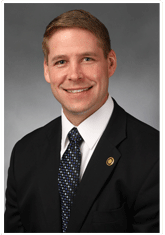JEFFERSON CITY — As those who regularly read this newsletter know, I am a proponent of tax reform in Missouri. It stands to reason that, with all the Missouri taxes that have been added over the years, we have not somehow magically fallen into the best possible tax system. Last year, we began the discussion about what is the best system for Missouri.
The first, and most important, question is: What makes one tax system better or worse than another? Many economists will tell you that all taxes cause harm. As a society, we absolutely believe that if you want less of something, you should tax it. We do this for cigarettes, alcohol and other “sin,” or vice products. Since all taxes do some sort of harm, it is important to debate which taxes do the most harm, and which do the least. Do we want less labor (income tax), fewer businesses (corporate tax), less tourism (specific sales taxes to rent hotel rooms or cars)? What is the right mix? Where can we go lower and where can we go higher? An important component has to be our current balance; we have to know where to begin.
Another consideration is economic development. Tax reform has often proven to be economically beneficial. Nationally, the Kennedy tax cuts, Reagan tax cuts and Bush tax cuts all created more revenue after they were implemented because they stimulated the economy. Our neighbor state, Oklahoma, lowered taxes a decade ago, and revenues went up so much that it just lowered rates again last year.
Tax cuts can also create jobs. Missouri uses targeted tax cuts to do that very thing with tax credits and other programs.
Prior to the 2013 session, my staff and I did extensive research on Missouri’s tax policy. We compared our tax structure to those of our neighboring states, and to those of the most often cited “growth” states. This information was presented to the Senate Ways and Means Committee, which I chair. It became the basis for Senate Bill 26 and House Bill 253, the two tax bills that went through the legislative process. SB 26 was put aside and HB 253, as you know, passed the Legislature, but was vetoed by the governor.
One of the things that became clear in our research is that the tax structures in states that were growing (in relation to indicators like residents, businesses, jobs, gross domestic product, and state revenue) were very different. Many had an absence of at least one of the three major tax streams (personal, corporate, sales) like Texas, Tennessee and Florida. Almost all relied less on personal income taxes. In fact, we found that Missouri relies more heavily (in percentage of total revenue) on its personal income tax than any other state at which we looked. Missouri’s personal income tax rate was also higher than most of its neighbors, a fact supported by The Tax Foundation, which the governor often quotes to call Missouri a supposed “low tax state.”
Finally, it should be clear that not all tax cuts are types of “reform.” In the past decade, we have singled out most retirement income, including veterans’ benefits, for tax exemptions. I carried the veterans’ bill and supported other such cuts; it was the right thing to do. But, because these tax cuts are targeted only to specific people, they do not really reform the system as a whole.
As we debate whether or not to reform taxes, we have to remain aware that standing still will only put Missouri further behind its neighbors and other states. Two of our neighboring states have lowered taxes, and several more are considering it. While the status quo may feel comfortable, and while any change is hard, Missouri cannot afford to let other states lead in this competitive climate. That is the conversation we must continue to have, and one I plan to lead again in 2014.
Please feel free to contact me with any questions or concerns at any time. We look forward to hearing your comments and suggestions and trying to answer any questions you may have. You can reach us by phone at 573-751-1464, or e-mail at will.kraus@senate.mo.gov. |



